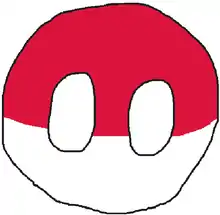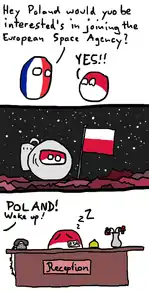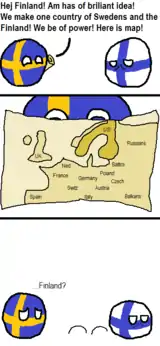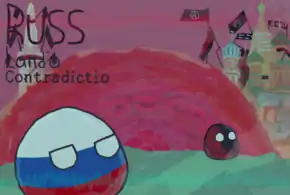Polandball
Polandball, also known as countryballs, is an art style occasionally used in online comics, in which countries are typically personified as spherical characters decorated with their country's flag. The characters often interact in broken English, commonly known as Engrish (with the exception of countryballs that speak English natively.) The dialog typically uses regional and/or national variations, depending on the region the character represents (e.g. France's Engrish is interspersed with French words.) The characters poke fun at national stereotypes and international relations, as well as historical conflicts. Countryballs have also been used in videos and comics involving alternate and speculative history. It is an Internet meme which originated on the /int/ board of German imageboard Krautchan.net in the latter half of 2009. The comics style may be referred to both as Polandball (by convention, even in cases where there is no Poland among the cartoon characters) and countryball (or, collectively, countryballs).

Background

Polandball has its roots in an August 2009 "cyberwar" between Polish Internet users and the rest of the world on drawball.com. The website, which offers a circular virtual canvas, allows Internet users to draw whatever they want, and to draw over others' drawings. On the Polish internet, an idea was raised to draw the Polish flag on the ball-shaped canvas, and thousands of Poles together managed to take over the drawball with a painting of white on top of red, with the word "POLSKA" written in the middle. After co-ordination from 4chan, this was then covered over by a giant swastika, an interaction which was repeated several times over the ensuing weeks.[1][2]
Krautchan.net was a German-language imageboard whose /int/ board was frequented by English-speaking netizens. The beginning of the Polandball meme is credited to Falco, a British user on /int/, who created the meme in September 2009 using Microsoft Paint in an apolitical way to troll Wojak, a Pole on the same board who contributed in broken English, after which Polandball cartoons were enthusiastically drawn by Russians.[1][3][4]
Polandball comics have no defined authors, and anyone is able to make one.[5] This has become an internet meme, presented e.g., on Reddit[4][6] and Facebook.[7][8]
Themes
Poland

The premise of Polandball is that it represents Poland and its history, relations with other countries and stereotypes,[3][9] focusing on Polish megalomania and national complexes.[2][10] With the exception of English-speaking ones, interactions between countryballs tend to be written in broken English and Internet slang, reminiscent of the lolcat meme, and by the end of the cartoon Poland, which is purposely represented as red on top of white (the reverse of the Polish flag), is typically seen weeping.[1][2]
Polandball depiction of Poland portrays a number of stereotypes. These include bad English use by Poles, blaming others for its failures in particular given the backdrop of repeated invasions by Russians and Germans (such as the 18th century partitions and World War II), Polish propensity for telling tales of the glorious past, and the perception of Poles as "dull-witted" and "psycho-Catholic".[11]
Some Polandball comics arise from the premise that Russia can fly into space, whilst Poland cannot.[12][13] One of the earliest Polandball comics begins with the premise that Earth is going to be struck by a giant meteor, leading to all countries with space technology leaving Earth and going into orbit around the planet. At the end of the cartoon, Poland, still on earth, is crying, and in broken English pronounces the canonical Polandball catchphrase "Poland cannot into space".[3][14] In this humorous way, Russians put a halt to all discussion with Poles on which country is superior.[1][3][9]
Other countries
Polandball can also include comics on other countries, but by convention these comics are usually still referred to as Polandball comics,[1] although they are sometimes also referred to as countryballs.[4] States, provinces, and other such divisions can also be used; multi-national organisations such as the European Union, NATO and United Nations are also common[5]
There are various other established conventions:[15]
- The 'r's and 'l's in East Asian nations' speech switch places in a stereotype of East Asians.
- The United States sports a pair of shades, is often depicted as overweight and frequently using firearms (and starting conflicts with other countries, especially when oil is involved), and regularly uses profanity. It regularly mistakes countryballs without a direct historical and/or political connection to it either for their neighbours or with those with similar flags. The state of Texas is frequently involved due to its larger than life persona: it is often depicted wearing a cowboy hat and it and Chile are frequently mistaken for each other (due to the similarity of their flags).
- Saudi Arabia wears a traditional Arab headdress, sunglasses, and, quite often, a sword.
- Japan sometimes wears cat ears.
- The United Kingdom wears a monocle and a top hat and often talks about when it was a superpower.[15]
- Hong Kong is depicted similarly to the United Kingdom, since it was once a territory of the United Kingdom).
- France is shown frequently with a baguette and commonly with a white flag (based on the joke that it frequently is the first country to surrender in a war).
- Russia is frequently seen with vodka and a ushanka.
- Finland is often depicted as a depressed and lonely drunkard wielding a traditional Finnish puukko.
- Canada is often seen wearing a coonskin cap.
- Kazakhstan is typically depicted as a brick.
- Israel is shown as a hypercube; Michigan is also shown as cube-like.
- Non-rectangular flags, such as those of Nepal, Ohio, and the Maratha Empire are shown as characters taking the shape of the flags, with the swallowtail part of the flag forming a "mouth" usually depicted with sharp teeth.
- The Republic of Venice is usually shown with the ribbons on the end of the flag acting similar to tentacles, while The Vatican is depicted wearing the traditional hat worn by the Pope.
- Serbia, Slovakia, Spain and Slovenia are usually shown with their coat of arms acting as eyepatches due to the location of these on the flag.
- Chad is often depicted with eight-balls for eyes to help differentiate it from Romania, deriving from Polandball comics often using eight-balls as a stand in for Black Africans with no affiliation to a particular state. Other billiard-ball traditions in Polandball include the seven-ball for Native Americans, the one-ball for East Asians and the six-ball for space aliens.
- Chile and The Gambia are sometimes depicted as worm-like rather than balls due to their geographic shape.
- Singapore and Bermuda are shown as triangles.
The simplicity of Polandball, added with its recognition of world history and a focus on current affairs, makes the meme suited to commenting on international events.[5] Amongst events which have been covered by Polandball and have been noted in the media, are the Senkaku Islands dispute,[16] the 2013 papal conclave which saw Jorge Mario Bergoglio being elected as the new Pope,[17] the 2014 Ukrainian crisis,[5][14][18] the 2014 Crimean crisis[6] and issues relating to Filipino workers in Taiwan.[19]
Assessment

A report on the Russian radio station Vesti FM noted a post on Livejournal which asked readers to list five images that come to mind when thinking of Poland or Poles. The five pages of responses, illustrating the deep historical ties between Russia and Poland, recalled subjects including False Dmitriy I, Tomek in the Land of the Kangaroos by Polish author Alfred Szklarski, Czterej pancerni i pies ("Four tank-men and a dog"), Russophobia and Polandball.[20]
Wojciech Oleksiak, writing on culture.pl, a project of the Polish government-funded Adam Mickiewicz Institute which has the aim of promoting Polish language and culture abroad, noted that due to anyone being able to create a Polandball comic, the existence of the meme has created new opportunities for people to express their personal views on race, religion and history. In describing Polandball as the Internet par excellence, he further stated that comic plots can be "rude, impolite, racist, abusive, or just plain dumb", whilst also noting that the politically incorrect nature of the comics add to the attractiveness of the meme.[21]
At the same time, Oleksiak notes that Polandball comics often employ exaggerated Polish stereotypes, such as Poles not being as proficient in English as other nationalities, and Poland itself being a country full of dull-witted hyper-Catholics. On the other hand, some stereotypes employed in Polandball comics, such as Poles telling stories about the nation's glorious history and dwelling on a deep rooted martyrdom, are mostly true; whilst the stereotype that Poles hold many national complexes and blame external forces for their own failures, is true, but somewhat justified.[21]
Oleksiak further notes that from Polandball, Poles can learn to have "a sense of humour about our long-time grudges".[21]
In popular culture

Polandball has become a popular subject particularly on social media sites such as Reddit, YouTube, and Twitter.[22][23][24] Certain YouTube channels that focus on Polandball such as Brain4breakfast reached 150,000 subscribers. The popularity of Polandball can be attributed to the ability of the drawings to tell short stories of nations, in a easily understandable fashion, often with a large amount of jokes and comical undertones, with the characterization of an group lending itself towards a short comic format.[25][26]
A game called "Polandball: Can into Space" was released in 2016 on PC and on 18 June 2020 for the Nintendo Switch.[27]
References
- Orliński, Wojciech (5 August 2014). "Wyniosłe lol zaborców, czyli Polandball" (in Polish). Gazeta Wyborcza. Archived from the original on 1 January 2012. Retrieved 6 August 2014.
- Zapałowski, Radosław (15 February 2010). "Znowu lecą z nami w... kulki" (in Polish). Cooltura. Archived from the original on 5 August 2014. Retrieved 6 August 2014.
- Kapiszewski, Kuba (5 April 2010). "Fenomem — Polska nie umieć kosmos" (in Polish). Przegląd. Archived from the original on 5 August 2014. Retrieved 5 August 2014.
- Plomlompom, Nils Dagsson Moskopp Erlehmann & Christian Heller (2013). "MS-Paint-Comics". Internet-Meme : kurz & geek (in German) (1 ed.). O'Reilly Verlag. pp. 86–88. ISBN 978-3-86899-806-1. Retrieved 5 August 2014.
- Fisher, Max (25 July 2014). "Everything you need to know about the Ukraine crisis". Vox Media. Retrieved 6 August 2014.
- Ryan, Emmet (4 March 2014). "Polandball is Reddit's answer to Crimea crisis". The Sunday Business Post. Retrieved 8 November 2014.
- "Polandball 2.0". www.facebook.com.
- "POLANDBALL". www.facebook.com.
- Cegielski, Tomek (12 April 2011). "MEMY. Legendy Internetu" (in Polish). Hiro.pl. Archived from the original on 15 April 2011. Retrieved 5 August 2014.
- Kralka, Jakub (11 May 2012). "Polski internet to potęga, po co te kompleksy?" (in Polish). Spider's Web. Archived from the original on 5 August 2014. Retrieved 5 August 2014.
- "Polandball – A Case Study". Culture.pl.
- "Mirosław Hermaszewski – pierwszy Polak w kosmosie". PolskieRadio.pl. Retrieved 22 June 2019.
- Chiaro, Delia (23 November 2017). The Language of Jokes in the Digital Age: Viral Humour. Routledge. ISBN 9781351379953 – via Google Books.
- Камышин «может в кантриболз». Infokam (in Russian). 7 August 2014. Archived from the original on 8 November 2014. Retrieved 8 November 2014.
- Hoffman, Steven (2 May 2015). "How Polandball can of taking over internets". Krakow Post. Retrieved 2 April 2016.
- "Japon, Chine, vers une nouvelle guerre froide". France Culture (in French). 9 March 2013. Archived from the original on 8 November 2014. Retrieved 8 November 2014.
- "Wybór Franciszka okiem internautów" (in Polish). Onet.pl. 14 March 2013. Archived from the original on 17 September 2014. Retrieved 6 August 2014. Alt URL
- Аниматор из Камышина нарисовал мультфильм о «заболевшей» Украине. Argumenty i Fakty (in Russian). Volgograd. 6 August 2014. Archived from the original on 8 November 2014. Retrieved 8 November 2014.
- "台灣最美麗的風景是人 真的嗎? (Taiwan is one of the most beautiful landscapes, really?)" (in Chinese). Apple Daily (Taiwanese edition). 31 July 2014. Archived from the original on 6 August 2014. Retrieved 6 August 2014.
- Klava, P. (25 August 2013). Польша у россиян ассоциируется с Лжедмитрием и Польшаром. Vesti FM (in Russian). Archived from the original on 8 November 2014. Retrieved 8 November 2014.
- Oleksiak, Wojciech (9 June 2014). "Polandball — A Case Study". Culture.pl. Adam Mickiewicz Institute. Archived from the original on 6 August 2014. Retrieved 6 August 2014.
- https://journals.lib.unb.ca/index.php/MC/article/view/21133
- https://www.reddit.com/r/polandball/
- https://dokumenty.osu.cz/ff/kaa/ojoep/ostrava-journal-vol1-2016-full.pdf#page=7
- https://pure.hva.nl/ws/files/4783722/INC_Longform_Polandball_is_of_Reddit_How_r_polandba...ted_Geopolitical_Satire_INC_Longform.pdf
- https://networkcultures.org/longform/2017/11/15/polandball-is-of-reddit-how-rpolandball-transcends-memes-through-carefully-curated-geopolitical-satire/
- "Polandball: Can Into Space for Nintendo Switch - Nintendo Game Details". www.nintendo.com.
External links
 Media related to Polandball at Wikimedia Commons
Media related to Polandball at Wikimedia Commons- Polandball subreddit